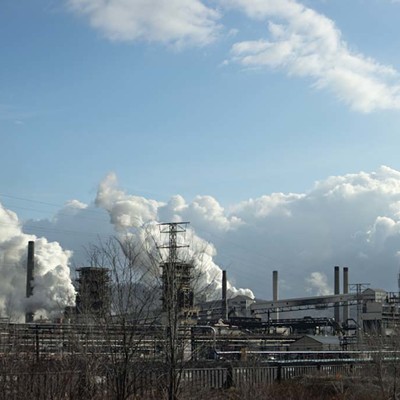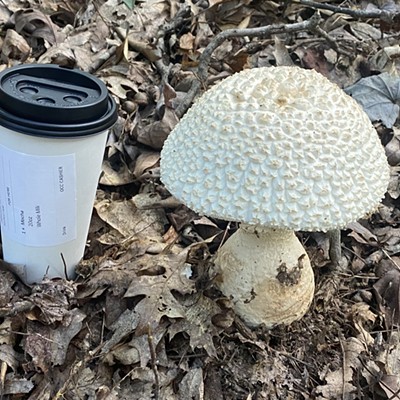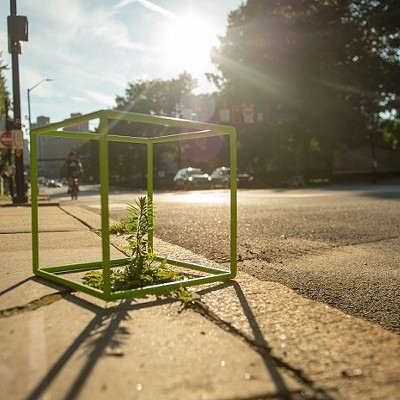If there's a way to discuss environmental problems and actually get everyone busy fixing them, we haven't found it. Climate change, deforestation, depleted fisheries, toxic dumping — despite years of talk, and floods of text and images, all these woes and more proceed apace. Too few of our leaders lead, and too many of us remain apathetic, or even unconvinced the problems are real.
Nonetheless, some ways of communicating green are more helpful than others. Take Pittsburgh-based literary journal Creative Nonfiction's themed spring issue, "The Human Face of Sustainability," and a recent talk at Pitt by author and blogger Vanessa Farquharson, "Sleeping Naked and Showering in the Dark: The Fun Path to Green Living."
Environmental sustainability means living in a way that doesn't prevent future generations from doing likewise. Instead, we're depleting the earth's resources and weakening the ecosystems that support us to the point of collapse; almost nothing our society does is sustainable. The Creative Nonfiction issue, guest-edited by Donna Seaman, includes nine essays by an international array of writers tackling sustainability from angles as diverse as: the rise in childhood cancer; water shortages in Northern Sudan; organic farming to relieve urban food deserts; and Wendy Rawlings' visionary piece linking her niece's life-threatening E. coli infection to the globalized economy, worker rights, consumerism and more.
Farquharson, a journalist with the Toronto-based National Post, spun her April 1 talk off of her 2009 book Sleeping Naked Is Green, which documents the year she spent making one green change in her life daily. Farquharson's user-friendly approach echoes how most Americans think about sustainability — and that's the problem.
Inspired (that is, alarmed) by Al Gore's climate-change film An Inconvenient Truth, she made changes as small as buying fewer magazines and as seemingly radical as selling her car, unplugging her fridge, and washing her hair with vinegar ... in the dark. Like most of us, she focuses on voluntary, individual green actions: To create your own successful green plan, she advised the Heinz Distinguished Lecture audience, "Acknowledge who you are and what you can do and what you want to do."
Trouble is, sustainability is a rigorous standard that doesn't really care "what you can do and what you want to do." Greening your own life is ethically correct, but it's not nearly adequate to fix global environmental crises. If greener living is merely an option, most people won't bother themselves nearly as much as Farquharson did, and some won't bother at all. Indeed, Farquharson herself admits she can't even convince her own sister to live greener. Farquharson's solution in the face of such intractability: "Focus more on yourself" and hope a "ripple effect" will inspire others, as it has with the trend toward reusable grocery bags.
Creative Nonfiction's palette is much broader. Seaman's lead interview with author and New Yorker journalist Elizabeth Kolbert sets the tone. "[S]ustainability is not recyling, nor bringing cloth bags to the supermarket," say Kolbert, whose new book is The Sixth Extinction. "It is fundamentally rethinking everything that we do, and it is living very, very differently."
True, other CN essayists second Farquharson's thoughts about individual initiative. Sarah Gilbert, for instance, writes thoughtfully about life in reputedly green Portland — where the mere sight of her cycling on a busy street fills motorists with reflexive rage. Gilbert argues that, merely by suggesting that there's another way to live, her public example might help break the social and psychological feedback loops that keep people living so unsustainably.
As a bike commuter myself, I empathize. But it's a long way from wanting to run me off the road to choosing to cash in your Navigator. And even in the unlikely event that every 10th person, say, stopped driving, it would still solve only a tiny fraction of our fossil-fuel problem.
We need to ask more basic questions about why we live like we do, and seek more thorough solutions.
Matthew Ferrence does the former in his essay about the leasing of his family's southwestern Pennsylvania farm for gas-drilling. Ferrence interrogates our culture's conception of value, asking why the land above — with its complex relationships of water, soil and plant and animal life — counts for less than the gas below: "Money is the only way to accurately render my economic, aesthetic, and emotional reaction to ... well, to anything. Right?"
Curiously, though, that's the closest anyone in this 86-page issue comes to directly challenging our culture's fundamentalist faith in economic "growth" — a faith that, unfortunately, produces at least as much destruction as it does benefits.
And while these essayists colorfully illuminate our unsustainability, they're short on solutions beyond the small-scale and personal. None of them, for instance, suggests implementing something so basic as a federal tax on carbon, which would surely get us using less fossil fuel, individual initiative or no.
But how to get political support for such a tax (aside from breaking oil lobbyists' stranglehold on Congress)?
When I asked Farquharson, after her talk, whether voluntary actions can really solve global problems like climate change, she acknowledged that "We need much bigger changes on a policy level" and that political activism is necessary to make such change happen.
But if we're going to change individual minds, they need to be changed toward such ends, not just toward using better lightbulbs. True, people who'll separate their recyclables won't necessarily take to the streets against fossil-fuel extraction, or for a carbon tax. But they definitely won't do such things if they don't hear about them, or if they think lowering the thermostat is sufficient contribution to the cause.
Still, it's important to remember that facts aren't everything. In her essay "The Seep," centering on a California oil spill, Mieke Eerkens suggests that our environmental crises are a matter not of too little knowledge, but of imperfect compassion. Recalling birds dying in squandered petroleum, she writes, "I don't believe people can understand why facts matter until their hearts know it, too."














